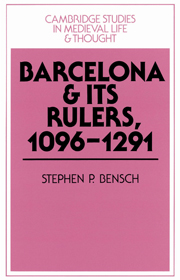Book contents
- Frontmatter
- Contents
- List of figures
- List of maps
- List of tables
- Preface
- List of abbreviations
- Introduction
- 1 The city and its region
- 2 The city and its lord
- 3 An aborted take-off: the urban economy in crisis, 1090–1140
- 4 Urban society in transition
- 5 The patriciate in gestation, 1140–1220
- 6 Family structure and the devolution of property
- 7 Consolidation and conflict: patrician power and Mediterranean expansion, 1220–1291
- 8 Patrician continuity and family identity
- Conclusion
- Appendix 1 Vicars of Barcelona
- Appendix 2 Bailiffs of Barcelona
- Appendix 3 Coinages and exchange values
- Appendix 4 Select documents
- Appendix 5 Select genealogies
- Bibliography
- Index
- Cambridge studies in medieval life and thought
6 - Family structure and the devolution of property
Published online by Cambridge University Press: 08 December 2009
- Frontmatter
- Contents
- List of figures
- List of maps
- List of tables
- Preface
- List of abbreviations
- Introduction
- 1 The city and its region
- 2 The city and its lord
- 3 An aborted take-off: the urban economy in crisis, 1090–1140
- 4 Urban society in transition
- 5 The patriciate in gestation, 1140–1220
- 6 Family structure and the devolution of property
- 7 Consolidation and conflict: patrician power and Mediterranean expansion, 1220–1291
- 8 Patrician continuity and family identity
- Conclusion
- Appendix 1 Vicars of Barcelona
- Appendix 2 Bailiffs of Barcelona
- Appendix 3 Coinages and exchange values
- Appendix 4 Select documents
- Appendix 5 Select genealogies
- Bibliography
- Index
- Cambridge studies in medieval life and thought
Summary
The attainment of power by a new group of Barcelonans involved not just the cumulative acts of individual entrepreneurs but the collective strategies of patrician families. While the importance of family organization and blood ties in structuring and perpetuating the power of medieval elites has long been acknowledged, early urban patriciates have in fact received little attention in the growing literature on domestic life and kinship. The dearth of materials for many towns before 1250 in part explains this neglect, but so too does the assumption that precocious social climbers, particularly wealthy burghers, the enfants terribles of medieval society, took their cue from the nobility. The high profile of aristocratic clans in the early city–republics of northern Italy, where a rich and carefully exploited documentation does exist, has accentuated the tendency to deny a distinctive pattern of family organization to early townspeople. Somewhat defensively medievalists have had to counter the charge that towns in themselves dissolved traditional family bonds, a theme dear to early sociologists and social reformers such as Weber and Le Play, who looked upon medieval towns as the avatars, for better or worse, of modern life. Yet the insistence on accentuating features that early urban communities held in common with other segments of medieval society has come at the price of denying them an autonomous evolution, especially in terms of family structure. In Barcelona, however, the economic blockage of the early twelfth century, the decline of agricultural entrepreneurs, the withering of an urban nobility, and the consolidation of ascendant families into an early patriciate at the beginning of the thirteenth century suggest that the forces reshaping a distinctively urban milieu encouraged a rearrangement of patrimonies and a restructuring of family bonds.
- Type
- Chapter
- Information
- Barcelona and its Rulers, 1096–1291 , pp. 234 - 276Publisher: Cambridge University PressPrint publication year: 1995
- 1
- Cited by



